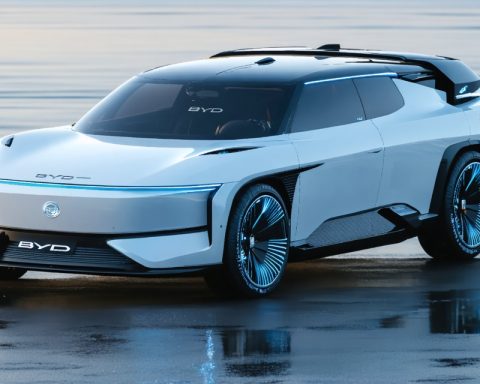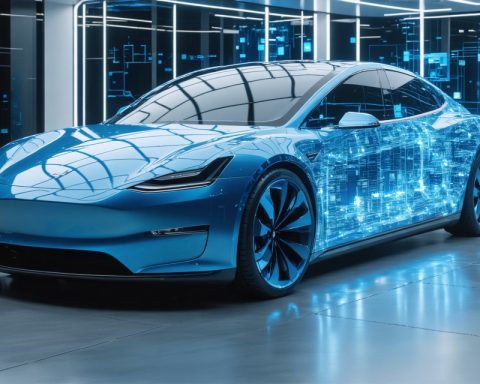The renowned French carmaker Alpine has continued its innovative journey in hydrogen technology with the unveiling of the Alpenglow Hy6, a groundbreaking hydrogen-fueled supercar.
This latest concept is the third version Alpine has showcased over the past two years, now featuring a formidable hydrogen-powered V-6 engine producing over 700 horsepower. The Alpenglow has retained its unique and striking design since its initial reveal at the Paris Motor Show in 2022, resembling a futuristic Le Mans racer with eye-catching aesthetic elements. This iteration introduces a transparent hood that reveals the powerful V-6 engine underneath.
The Alpenglow Hy6 is particularly notable for its new powertrain. After two years of development, the hydrogen-powered twin-turbocharged 3.5-liter V-6 engine emerges as an impressive engineering feat. The prior version featured a turbocharged 2.0-liter inline-four engine, but the current model boasts a substantial increase in power. Paired with a six-speed sequential gearbox and supported by three hydrogen tanks, the engine delivers an impressive 730 horsepower, 568 ft-lbs of torque, and can reach a top speed of 205 mph. This emission-free powertrain takes Alpine into a new realm of sustainable performance.
Beyond the Alpenglow Hy6, Alpine is also progressing with a new supercar project. Set to be developed at the new Hypertech Alpine R&D center in France, expectations lean towards an electric-powered model. Nonetheless, Alpine’s commitment to hydrogen power remains evident, leaving open the possibility of future hydrogen-fueled vehicles designed for both road and track.
The Impact of Hydrogen Technology on Transportation and Beyond
In recent years, the spotlight on renewable energy sources has intensified, and hydrogen technology is emerging as a key player in the shift towards sustainable transportation. The unveiling of carmakers like Alpine’s hydrogen-fueled supercar, the Alpenglow Hy6, is a testament to the growing interest and innovation in hydrogen-powered vehicles. But what does this mean for people, communities, and countries globally? Let’s explore the implications and some interesting aspects of this revolutionary technology.
The Shift Towards Hydrogen-Powered Vehicles
Hydrogen technology offers a promising alternative to traditional fossil fuels and even to some electric vehicles. One of the most significant benefits is its potential for zero-CO2 emissions, which is crucial in combating climate change. Vehicles like the Alpenglow Hy6 demonstrate that hydrogen-powered engines can deliver impressive performance without harmful emissions, making them highly appealing to environmentally conscious consumers.
The development of hydrogen technology not only supports the automotive industry’s move toward sustainability but also sparks advancements in infrastructure. With an increase in hydrogen vehicles, there will be a corresponding need for hydrogen refueling stations. This presents a new industry sector, providing job opportunities and stimulating economic growth in local communities.
Hydrogen: A Global Fuel Solution?
Hydrogen technology has implications beyond just personal transportation. Countries around the world are considering hydrogen as a key element of their renewable energy strategies. Nations like Japan and Germany are investing heavily in hydrogen infrastructure, seeing it as a way to reduce their reliance on imported fossil fuels and to diminish carbon emissions.
This push towards hydrogen energy systems can improve energy security for many countries, allowing them to capitalize on local resources for hydrogen production, such as water and renewable electricity. Hydrogen can also be used for various applications, including power generation and industrial processes, showcasing its versatility.
Challenges and Controversies
Despite its many advantages, hydrogen technology is not without challenges. The production of hydrogen, especially green hydrogen (produced using renewable energy), is currently expensive and energy-intensive. This cost can be a barrier to widespread adoption. Additionally, the infrastructure for hydrogen distribution is still in its infancy compared to more established systems for electric vehicles or gasoline.
There are controversies around the energy efficiency of hydrogen compared to battery electric vehicles. Critics argue that hydrogen vehicles may not be as efficient as direct electricity use from batteries. These debates are crucial in guiding the future direction of hydrogen technology and policy regulations.
The Road Ahead
As carmakers like Alpine forge ahead with hydrogen-powered innovations, the technology continues to evolve, promising a greener future. Hydrogen technology’s impact on people, communities, and countries is multifaceted, offering environmental, economic, and strategic benefits. However, overcoming the current challenges will require concerted efforts from governments, industries, and researchers globally.
For more information on hydrogen technology and its implications, you can visit resources such as the U.S. Department of Energy or the Hydrogen Council.















